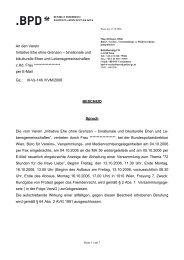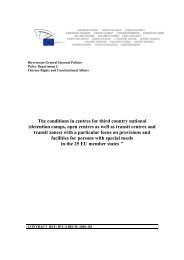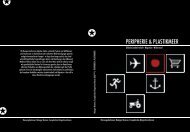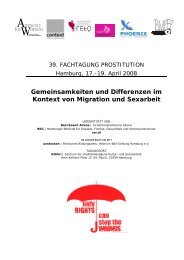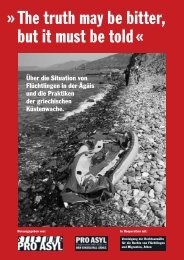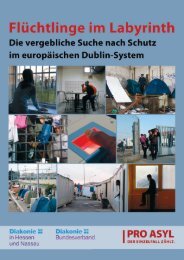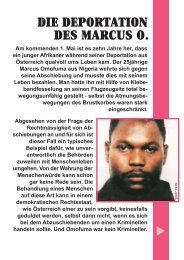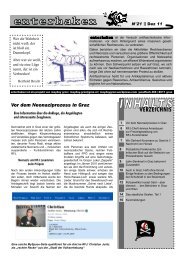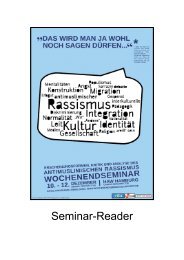Turin's CIE - International University College of Turin
Turin's CIE - International University College of Turin
Turin's CIE - International University College of Turin
Create successful ePaper yourself
Turn your PDF publications into a flip-book with our unique Google optimized e-Paper software.
language support in a similar way [to prison]. Unfortunately, everything happens in this<br />
sort <strong>of</strong> heavy atmosphere within the unconcerned <strong>CIE</strong> environment, and so everything is<br />
vague and the space for rights is very limited” (Interview 10).<br />
Our interviewees criticised the ad hoc provision <strong>of</strong> interpreters because the interpreters who<br />
are used can range from police <strong>of</strong>ficers and Red Cross staff to family members who interpret via<br />
telephone. Using non-pr<strong>of</strong>essional interpreters challenges lawyer-client confidentiality and it<br />
limits the questions that lawyers can ask clients, particularly when the authorities are<br />
interpreting:<br />
“There is a lack <strong>of</strong> interpreters and language may play a key role in the interview. It<br />
happened that I once had to ask a detainee about the way in which he had been detained in<br />
Lampedusa, to hypothesise about whether there had been a kidnapping <strong>of</strong> person [by the<br />
authorities]. The only person who could help me with interpretation was a police <strong>of</strong>ficer!<br />
Clearly, I could not enter into specific questions about the issue. We are missing a law that<br />
[specifically] regulates <strong>CIE</strong> interviews, also in relation to interpreters” (Interview 5).<br />
Similarly, using well-meaning interpreters who are not pr<strong>of</strong>essionally trained increases the risk<br />
<strong>of</strong> accidently relaying important and at times technical legal information inaccurately:<br />
“We have lots <strong>of</strong> problems with those who do not speak Italian. Sometimes Red Cross<br />
workers help us as interpreters but they are not so keen on doing it. They help us only when<br />
they realise the person really needs to talk with a lawyer to explain something. Once I had<br />
to speak on the phone with my client’s sister in Italian and then pass the phone to my client<br />
so that her sister could explain to her in Arabic what I was saying. Very complicated!”<br />
(Interview 8)<br />
5. LACK OF TRUST<br />
Immigration detainees are vulnerable and <strong>of</strong>ten trying to decipher a foreign legal system in a<br />
second language, so they rely on the help and expertise <strong>of</strong> pr<strong>of</strong>essionals. Consequently, a lawyer<br />
can be a detainee’s most significant support or link to the outside world. However, detainees<br />
<strong>of</strong>ten complain that they cannot get in touch with their lawyers, even for matters as<br />
fundamental as organising telephone advice or an appointment. Lack <strong>of</strong> communication can<br />
foster a lack <strong>of</strong> trust.<br />
Sometimes detainees who were transferred from jail to <strong>CIE</strong> consider their interactions with<br />
their previous lawyer to have been a failure and they frequently hold lawyers responsible for<br />
their additional <strong>CIE</strong> detention. Our study revealed that <strong>of</strong>ten criminal lawyers do not clearly<br />
explain to their immigrant clients about the identification procedure and the realistic possibility<br />
<strong>of</strong> being detained in <strong>CIE</strong> after release from prison.<br />
Many detainee interviews showed a general distrust <strong>of</strong> a system that does not appear<br />
transparent or based on the rule <strong>of</strong> law: “There is a mafia-like agreement involving police, judges<br />
and lawyers. The lawyer has an unfair agreement with the <strong>CIE</strong> in order to extend the detention as<br />
this would mean more money for the Italian Government from the European Union” (Interview<br />
15). This detainee did not perceive <strong>of</strong> their personal lawyer as a personal representative but<br />
rather as another element <strong>of</strong> an untrustworthy system that was acting in concert.<br />
71 | P a g e




